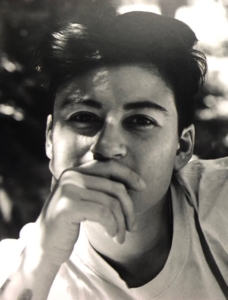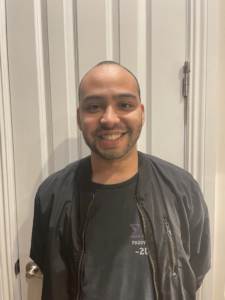Publicity, Inclusivity, and Parasite: An Interview with Laura Buccieri
Laura Buccieri is the Director of Publicity at Copper Canyon Press. During the December 2020 Antioch MFA residency, Laura gave a seminar on poetry and publicity. I was delighted to have the opportunity to speak with Laura over Zoom about her writing, her career in the publishing industry, and the film Parasite, directed by Bong Joon Ho. Laura Buccieri is the author of the poetry collections Songbook for a Boy Inside (Belladonna*, 2018), as well as On Being Mistaken (Pank, 2018).
Nicholas Galvez: You’ve done so many things in the literary world. How have those experiences led you to where you are right now?
Laura Buccieri: Publishing in general is very iterative. I did my undergrad and I studied creative writing at NYU and then I did my MFA at the New School and studied poetry. That not only influenced my writing and pushed me to write but it also really opened my eyes to the different facets of the publishing industry. While I was in my MFA, I worked at a bookstore—which I recommend to everybody because I think you learn so much about the industry from working at a bookstore— and then after I worked at Literary Hub, which was great. I got to see more of the editorial side of things, how pitches come in from publishers. Then that led into Copper Canyon.
One of my mentors knew Copper Canyon was looking for a publicist. I hadn’t necessarily done publicity before, so I looked through the job description and thought I would really like to try it. Having published books before coming to Copper Canyon, I could understand where the authors are coming from when they come into the process. Aligning with that viewpoint is also important in my work.
NG: I imagine that you meet so many writers and have good connections. I saw that you pitch collections to The New York Times and a few other places that are high profile.
LB: One of the aspects of my position at Copper Canyon is pitching the books. It’s important because it’s the first time these editors, assigning editors, reviewers are seeing the book, so I put a lot of weight on making sure I pitch the book well and align myself with the author’s views and take everything I can and put it behind that pitch. It’s important and a lot of fun. A lot of that is over Zoom now, which is crazy but yeah, it’s a blast.
NG: What’s it like working at an independent nonprofit press?
LB: In terms of what’s published I don’t think there’s much of a difference, I think it’s just more of the business model. I love working at Copper Canyon. We publish only poetry, which I think is so cool to say because that’s where my heart and interests lie, so I feel very lucky to be able to do that. I love poetry, so I’m getting to advocate for poetry and make sure that our poets’ voices are seen and heard which, to me, is huge. Poetry is being talked about more in the mainstream, so I think it’s a really interesting time to be publishing poetry. It’s never not.
NG: It’s funny, because I said something along the lines about how poetry was on the come up a few years ago and everyone looked at me like I was crazy, and now poetry is on the come up and I’m like, well, I told you guys.
LB: Amanda [Gorman] read at not only the Inauguration but also the Super Bowl, which was crazy. A person who’s writing poetry right now can see a person performing at the Super Bowl who’s a poet and they can see that, maybe that would be my end goal, maybe I have something to dream about that’s beyond the page, beyond the classroom, and I think that’s huge.
NG: Whenever I talk about poetry I always feel out of my element because I’m used to fiction, so I only really know the main names like Jericho Brown, Ocean Vuong, I guess Rupi Kaur. She has a huge social media presence, which I find interesting. I wonder how poets are going to use that to their advantage, especially with apps and sites like TikTok and YouTube?
LB: We’ll see, right? A lot of people feel like they’re out of their element when they talk about poetry and I feel like it’s so much because of how it was taught to us. I’m excited that contemporary poetry is being taught more at high schools and universities. To bring it into more contemporary language demystifies a lot of it.
NG: Especially now that we’re deconstructing the western canon and adding new voices, we’re seeing a lot of different talents and perspectives.
LB: We can talk about raising and giving more power to different voices in the United States, but we can also talk about expanding to international poetry and translation, because it seems to me that poetry is regarded so differently outside of the United States. Particularly, the United States has a very different concept of poetry, so bringing in international voices and translations is exciting.
We can talk about raising and giving more power to different voices in the United States, but we can also talk about expanding to international poetry and translation, because it seems to me that poetry is regarded so differently outside of the United States. Particularly, the United States has a very different concept of poetry, so bringing in international voices and translations is exciting.
NG: It was awesome when Parasite won Best Picture at the Oscars. Seeing a Korean film win was pretty awesome.
LB: Yeah, that’s a great parallel. We always have a translation category in any book award. Wouldn’t it be cool if, like Parasite did, a book in translation didn’t just win in the translation category but won Best Fiction? Parasite was so good. I could watch it five different times and see five different things.
NG: It honestly should be taught in creative writing classes.
LB: Have you read the script for it?
NG: I’ve read a little bit but, because I’m a fiction writer, I try to approach my writing as if I’m writing a screenplay. So I need to have my backgrounds filled with things to do so my characters can actually live and act like a world that’s already being lived in. Getting back to publishing, how do you feel about the publishing industry going forward? I feel like with artists uploading to TikTok and other places it borders on self-publishing. I was wondering how you see the publishing industry going forward if that becomes a trend.
LB: I mean, it’s been a terrible year and there’s been so much tragedy and you can’t speak on 2020 without speaking about that. I think people are reading more books and I think people are buying more books and I think that in and of itself is really interesting, to see that turn towards books. To your question about self-publishing versus publishing with a publisher, I think that it depends on two very different valid avenues. I don’t necessarily think that people uploading their photo to Instagram can put art galleries out of business, so I think they’re two separate things. I think they can coexist really beautifully.
In terms of the publishing industry versus self-publishing I think they have coexisted, and I hope they continue to coexist. Self-publishing can afford you vastly different things than publishing with a publisher and vice versa. With publishing going forward, I’m hopeful. I hope people continue to buy books and read books and find interesting ways to use technology to get the word out more about books. I think we’ve all gotten kind of tired of Zoom readings, but at the same time, I’ve gotten to attend so many more readings that happen in places I’m not, so I‘m hopeful that we can find a way to use technology in a really positive way to further what we can do.
NG: I don’t think publishing is ever really going to go out of style because even though people say that reading is on the decline because of digital media, people are still reading by the ton even if it’s genre fiction. It’s still a very strong business.
LB: Think about children’s books. Somebody has to publish them. I can’t think of a world without children’s books. That would just be a world I don’t want to live in. My hope is that if children’s books still exist, then so will poetry and novels and other physical forms of books.
NG: Well, if poetry becomes a desolate art form in the very far future at least people can read Dr. Seuss on the daily.
LB: Exactly. Dr. Seuss is such a poet.
NG: Questionable politics but a good writer.
LB: Oh yeah. Oh yeah.
NG: That’s one of the things that I had trouble with because, especially in 2020, we’ve really been seeing the dark side of people. So, with people like Dr. Seuss, it’s interesting to have to question your morals when it comes to accepting art.
LB: There’s just so much to say about it, but I do think there are good conversations about it. It’s not just publishing, it’s everywhere: politics, movies, music—anything—startups, tech companies. And I think, hopefully, the discussion goes beyond just publishing.
You can find Laura’s works here:
Songbook for a Boy Inside (Belladonna*, 2018)
http://www.belladonnaseries.org/chaplets (chaplet 241)
On Being Mistaken (Pank, 2018)
https://pankmagazine.com/shop/on-being-mistaken/
Recent publications by Copper Canyon Press:
- Waterbaby by Nikki Wallschlaeger (April 6, 2021)
- The Glass Constellation by Arthur Sze (April 13, 2021)
- Water I Won’t Touch by Kayleb Rae Candrilli (April 20, 2021)
- Dialogues with Rising Tides by Kelli Russell Agodon (April 27, 2021)
Nicholas Galvez is an MFA Student at Antioch University. He received his B.A. from Florida Southern College in Lakeland, Florida. When not reading or writing, he likes to sing, sleep, and water plants.






